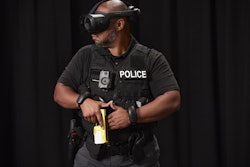Last month, Newsweek published an opinion piece—co-authored by a pair of gentlemen named Ben Klosky and Robert Lerman—titled The One Thing That Could Improve American Policing That No One Is Talking About.
Setting aside any obvious criticism that the headline looks a lot like those "clickbait" ads—with hooks like "You'll Never Believe What Happens Next" or "They Didn't Know Cameras Were Rolling"—the actual content of the article merits some contemplation.
The column opens with a predictable preamble about the factionalization of the public discourse following incidents like the reprehensible incident in Memphis earlier this year. The first paragraph has all the requisite search-engine friendly terms like "police brutality" and "racism" and "unarmed individuals."
The second paragraph, however, gets downright interesting. It says:
"The truth is a bit more complex: American policing is plagued with many problems, but when it comes to the inappropriate use of violence, one culprit is weaknesses in the selection of police officers and in academy training. Better selection and better training can reduce the problem of police brutality, and one strategy for improving both is expanding the use of police apprenticeships as an alternative to the traditional police academy."
It merits mention that Klosky is presently pursuing a Masters in Economics at American University, where Lerman is Emeritus Professor of Economics. But being academics in economics is not the sum total of the authors' bona fides—Klosky is a former police apprentice in Fairfax County, Virginia, and Lerman is Board Chair of Apprenticeships for America.
They know a little something about apprenticeships.
On Paper vs. In Practice
Klosky and Lerman accurately assess one of the major problems in the recruiting and hiring of police officers in today's environment. They note that because of a dwindling number of interested candidates—due in part to "feelings of anti-police sentiment" and "plentiful alternative opportunities in our strong labor market"—some departments have reduced qualification requirements in education and other areas.
Then they fall flat on their face by arguing that some of the now-eliminated standards—such as low credit scores or past marijuana use—may have "disqualified many potentially strong applicants."
Perhaps this is so—and possibly not—but it's absolutely, positively, unquestionably certain that the lowering of standards has led to what can in some cases only be called hiring malpractice. There are—without even a shadow of a doubt—people in police uniforms today who have been hired under lowered standards and are little more than ticking time bombs if future misconduct.
With regard to training, Klosky and Lerman posit a thought-provoking—if not entirely achievable—concept. They say that instead of traditional academies—which typically require two or three months of academy time followed by several months of in-service "probationary" or FTO time—policing should institute apprenticeship programs. They argue that in such programs future officers would "serve as apprentices or cadets for a two-to-three-year program" during which agencies would be able to "observe cadets in high-pressure situations and identify problematic candidates long before they are offered jobs as armed police officers."
Klosky and Lerman don't specifically articulate it in their column, but one might surmise that they believe such a program would be a compelling career opportunity for a young person who otherwise might choose another profession. This value proposition, would be better than say, becoming an entry-level software engineers with a salary multiples better than a first-year police apprentice not yet even sworn to fully enforce the law.
Sorry—that's probably not going to happen.
All is Not Lost
The suggestion offered by Klosky and Lerman looks great on paper. Long-term recruiting / training programs created and maintained with the stated intention of attracting interested young people into the police profession sounds like—and, in fact, is—an outstanding idea. The problem is, simply standing up a six-week program for high school kids seems to be too much for many agencies to manage. Launching something as ambitious as what is proposed in this Newsweek piece borders on fantasy.
Consider the fact that there are thousands upon thousands of vacant apprenticeships in vocations commonly called "the trades"—construction, HVAC engineering, pipe-fitting, plumbing, vehicle mechanics, welding, and the like—despite their high-paying wages and virtual guarantee that you won't get shot at on the job.
There are countless scholarships available to do the training to enter such professions, and even the nationally known and celebrity endorsed Mike Rowe Works Foundation laments difficulties in filling positions.
This isn't to say that the proposal presented by Klosky and Lerman is without worth—on the contrary, they may very well be onto something really groundbreaking and potentially game-changing. Some of what they write in this piece is pretty close to the candid opinions of many people in the police training universe—at least when those trainers let their guard down and actually speak their mind, and not repeat an agency's party line.
The insinuation that traditional academies can be entirely replaced by apprenticeship programs rings hollow—an untenable long-term strategy (at best) and an almost impossible short-term tactic to implement (at worst)—but some hybrid model might actually be workable.
Perhaps a starting point would be a "next-level" Explorer or Cadet program that goes beyond simply attending a few hours of classes per week and volunteering to direct traffic in the parking lot at the County Fair. Perhaps "graduates" of a youth program enter into a part-time paid position doing—as is suggested in the Newsweek piece—the duties of non-sworn personnel in maintenance, records, or administrative divisions. Such an effort would automatically draw candidates from the local community, hopefully reflecting the diversity of the citizens who live there.
It's certainly advisable—even valuable—to "recruit from a more diverse pool of candidates than traditional recruiting" as is suggested by Klosky and Lerman. The Newsweek co-authors are also spot-on when they state that police apprenticeships could—and probably would—lengthen the duration of training and emphasize "extensive on-the-job learning."
It's certainly advisable—even valuable—to entertain suggestions of new approaches to the matter of recruiting and training new officers, because as the saying goes, if you keep doing what you've been doing, you're going to keep getting what you've got.

















